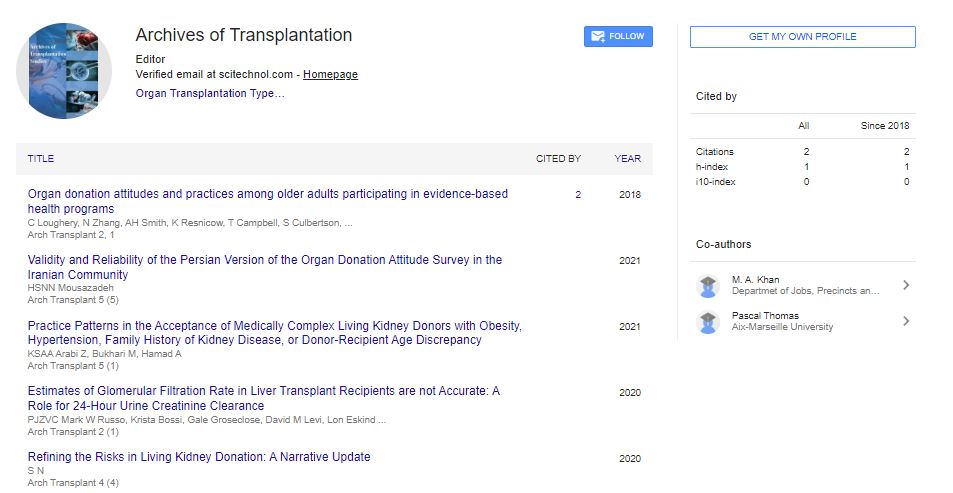Commentary, Arch Transplant Vol: 7 Issue: 2
Uses of Transplantation Techniques in Cancer Treatment
Ingrid Woelfel*
1Department of Surgery, University of Pennsylvania, Pennsylvania, USA
*Corresponding Author: Ingrid Woelfel,
Department of Surgery, University of
Pennsylvania, Pennsylvania, USA
E-mail: Ingrid@wlf.org
Received date: 24 May, 2023, Manuscript No. AT-23-107821;
Editor assigned date: 26 May, 2023, PreQC No. AT-23-107821 (PQ);
Reviewed date: 13 June, 2023, QC No. AT-23-107821;
Revised date: 20 June, 2023, Manuscript No. AT-23-107821 (R);
Published date: 27 June, 2023 DOI: 10.4172/AT.1000140
Citation: Woelfel I (2023) Uses of Transplantation Techniques in Cancer Treatment. Arch Transplant 7:2.
Description
Cancer remains one of the most formidable challenges in modern medicine, affecting millions of lives worldwide. With the rapid advancements in medical science, there is a growing focus on innovative therapies to combat this devastating disease. Transplantation techniques, traditionally associated with organ replacement, have now emerged as promising avenues in cancer therapy. Conventional cancer treatments, such as surgery, chemotherapy, and radiation therapy, have been the mainstay of cancer management for decades. While these treatments have led to significant improvements in survival rates, they often come with substantial side effects and limited effectiveness in advanced cases. As cancer's complexity and heterogeneity are better understood, personalized and targeted therapies have gained momentum, using in a new era of cancer treatment. Transplantation techniques, initially designed for organ replacement, involve transferring healthy tissues, cells, or even entire organs from a donor to a recipient. In the context of cancer therapy, these techniques have evolved to focus on two primary approaches: Hematopoietic Stem Cell Transplantation (HSCT) and cellular immunotherapies.
HSCT is a well-established procedure used to treat certain types of hematologic cancers, such as leukemia and lymphoma. It involves infusing healthy stem cells from a compatible donor into a patient after high-dose chemotherapy or radiation therapy. The transplanted stem cells migrate to the bone marrow and restore the patient's blood and immune cell production, replacing the cancerous cells with healthy ones. HSCT offers the potential for a "graft-versus-tumor" effect, wherein the transplanted immune cells recognize and attack the remaining cancer cells, providing an additional layer of anti-cancer activity. This therapeutic approach has shown remarkable success in patients with otherwise incurable malignancies and has contributed to significant advancements in cancer survival rates.
Cellular immunotherapies represent a revolutionary approach in cancer treatment, leveraging the power of a patient's immune system to identify and eliminate cancer cells selectively. Two prominent examples of cellular immunotherapies are Chimeric Antigen Receptor (CAR) T-cell therapy and checkpoint inhibitors.
In this cutting-edge technique, T cells, a type of immune cell, are collected from a patient's blood and genetically modified in the laboratory to express chimeric antigen receptors. These receptors enable T cells to recognize specific surface proteins on cancer cells, effectively targeting and destroying them. CAR T-cell therapy has demonstrated unprecedented success in treating certain types of leukemia and lymphoma, transforming the prognosis for many patients. Cancer cells often exploit "checkpoint" molecules to evade the immune system's detection. Checkpoint inhibitors are drugs designed to block these molecules, allowing the immune system to recognize and attack cancer cells more effectively. Immune checkpoint inhibitors have shown remarkable efficacy in various solid tumors, including melanoma, lung cancer, and bladder cancer. While transplantation techniques in cancer therapy offer promising outcomes, they also present significant challenges that warrant careful consideration. HSCT's graft-versus-tumor effect can inadvertently lead to Graftversus- host disease, a condition in which donor immune cells attack the recipient's healthy tissues. Graft-versus-host disease can be severe and potentially life-threatening. CAR T-cell therapy, can cause severe and potentially life-threatening side effects, such as Cytokine Release Syndrome (CRS) and neurologic toxicities. Proper management and patient selection are important to minimizing these adverse events. Transplantation techniques are most effective in certain types of cancers and may not be suitable for all patients or cancer types. Robust research is ongoing to broaden the range of cancers that can benefit from these therapies.
